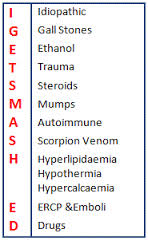Pancreatitis is the inflammation that takes place in the organ pancreas which plays a vital role in the digestion, blood glucose control as well as by hormone secretion. The inflammation can take place due to many different causes although the underlying problem in most of these instances is the pre-activation of digestive enzymes secreted by the pancreas before it reaches the intestinal tract. Thus, such activation of digestive enzymes within the substance of pancreas will lead to a process of auto digestion which means that the secretions made by an organ acts against the same tissues and destroys the cells belonging to the same.
What can cause a pancreatitis?
 When coming to the causes of pancreatitis, there is a mnemonic that can help you remember them – “I Get Smashed”. You can find it in the right picture. Thus, among these causes, alcoholism, gallstone disease, surgery, smoking, high calcium levels in the blood, Excessive parathyroid hormones in the blood, infections as well as severe ulcer disease can be highlighted as the main causative factors. But, there can be many other causes leading to the development of pancreatitis in a previously healthy individual as well. Let us go on in details as below.
When coming to the causes of pancreatitis, there is a mnemonic that can help you remember them – “I Get Smashed”. You can find it in the right picture. Thus, among these causes, alcoholism, gallstone disease, surgery, smoking, high calcium levels in the blood, Excessive parathyroid hormones in the blood, infections as well as severe ulcer disease can be highlighted as the main causative factors. But, there can be many other causes leading to the development of pancreatitis in a previously healthy individual as well. Let us go on in details as below.
As we mentioned above, acute pancreatitis is a disorder of the pancreas associated with an inflammatory process of the pancreas itself. It is manifested by destruction of the pancreatic cells due to the digestive action of the pancreatic enzymes in their active form on the pancreatic tissue. This leads to damage to the normal function of the pancreas.
The reason why the enzymes of the pancreas digest the pancreatic tissue is due to a blockage of the biliary canal by a cholesterol stone. This leads to backflow of the activated enzymes to the pancreatic canal and subsequently leading to auto-digestion of the pancreatic tissue. The enzymes of the pancreas are normally secreted in an inactive form to the duodenum. There they become functional and become able to digest the food in the intestine.
Acute pancreatitis can also arise due to the administration of alcohol. The effect of the administration of alcohol is more manifested in chronic pancreatitis than in acute pancreatitis.
The pancreas has both an endocrine as well as an exocrine function. The endocrine function of the pancreas has to do with direct secretion to the blood of two hormones. These are insulin and glucagon. Both of these hormones are engaged in glucose metabolism in the blood.
Insulin regulates the levels of glucose in the blood by reducing its concentration in the blood. It does so by promoting the entry of glucose molecules into liver cells. There glucose molecules are metabolized by the process that is called glycolysis in order to generate energy in the form of ATP molecules.
Lack of the hormone insulin as occurs in type I diabetes mellitus causes hyperglycemia in the blood leading to specific symptoms associated with diabetes such as weight loss and glycosuria.
Glycogen functions the opposite way to insulin. It stimulates the degradation of the glucose polymer glycogen to its glucose molecules.
In certain tumors of the endocrine pancreas glucagon is oversecreted which leads to hyperglycemia and diabetic symptoms. This condition is called glucagonoma. Tumors of insulin secreting cells of the pancreas leads to a condition that is called insulinoma which is manifested as hypoglycemia.
The exocrine pancreas is as important as the endocrine pancreas. It secretes via the pancreatic duct and not to the blood three types of hormones that digest the several types of food ingested in the diet.
Proteins are digested using an enzyme that is called trypsin and another enzyme that is called chymotrypsin. These two enzymes are specific for proteins. They differ in their specificity for the amino acids in the polypeptide chains.
Proteins are also partially digested in the stomach by the action of another enzyme that is called pepsin.
Carbohydrates in the diet are digested by an enzyme that is secreted by the exocrine pancreas. This enzyme is called amylase. This enzyme is also secreted by the salivary glands in the mouth such as the parotid gland. It helps to digest partially the food in the mouth. Thus contributing to the digestion of food before it enters the stomach.
Lipids in the diet are digested in the intestine by the action of an enzyme that is called lipase. This enzyme is secreted only by the pancreas. Therefore its deficiency as occurs in chronic pancreatitis leads to maldigestion and malabsorption.
Acute pancreatitis can be triggered by other causes than obstruction of the biliary canal and by alcohol. It can be triggered by excessive amount of calcium in the blood or hypercalcemia due to hyperparathyroidism for example or due to a malignancy that secretes parathyroid like hormone.
It is postulated that calcium activates the inactive form of the enzyme trypsin which is trypsinogen. Thus making the conversion between the two forms of enzymes faster.
Lipids in the blood or hyperlipidemia can also predispose to acute pancreatitis. It is thought that the fatty acids product of triglycerides obtained by the action of the lipase on the triglycerides stimulate the destruction or injury of pancreatic cells.
Hypothermic conditions and shock can also predispose to acute pancreatitis by the mechanism of low oxygen and low nutrients supply to the pancreatic cells. Thus leading to the destruction of the cells of the pancreas.
There are certain drugs that are toxic to the pancreatic cells such as the diuretic thiazide which can cause acute pancreatitis.
What are the Complications?
 The process of pancreatitis can take place either as an acute event or else as a chronic event. Although in most instances the acute manifestations can recover without progressing into major complications certain acute events may lead to severe and life threatening complications or else towards a chronic pancreatitis. Thus, both events can lead to complications although the nature of these manifestations may vary in each instance.
The process of pancreatitis can take place either as an acute event or else as a chronic event. Although in most instances the acute manifestations can recover without progressing into major complications certain acute events may lead to severe and life threatening complications or else towards a chronic pancreatitis. Thus, both events can lead to complications although the nature of these manifestations may vary in each instance.
When talking about complications, diabetes is something that we can’t forget as the pancreas will be the manufacturing point for the hormone, insulin. Thus, scar tissue formation as seen in severe acute pancreatitis or else in chronic pancreatitis, will disrupt the secretion of insulin and these individual would have to be treated as diabetics.
When a person is suffering from severe pancreatitis, it is possible for these individuals to develop breathing problems and this may partly be due to the pain which becomes worse with breathing and more often due to certain chemicals acting on the respiration.
Infection is another serious and a life threatening complication that may develop following scarring of the pancreas. Thus, the first sign of infections need to be taken seriously and vigorously treated to prevent any further damage.
As described earlier, when digestive enzymes are no longer helping out the process, there will be a significant malnutrition taking place and therefore they may require additional supplements to keep themselves going.
Apart from the above mentioned complications, pancreatitis can also cause kidney failure, pancreatic cancer as well as pancreatic pseudo cysts which may require surgical interventions in some instances.

